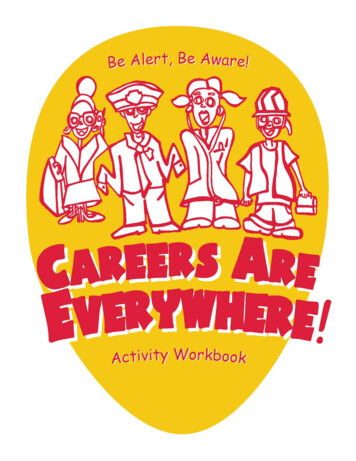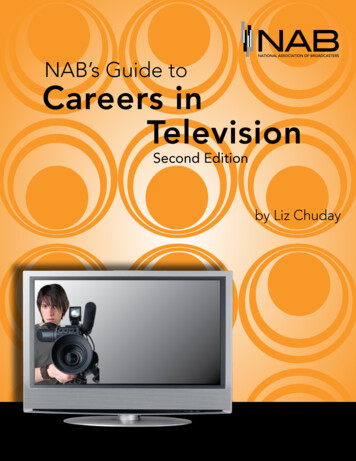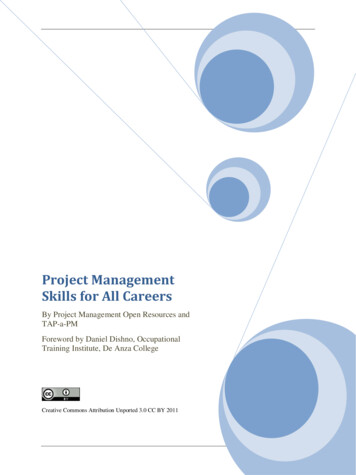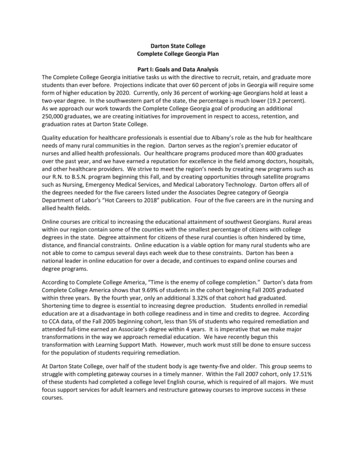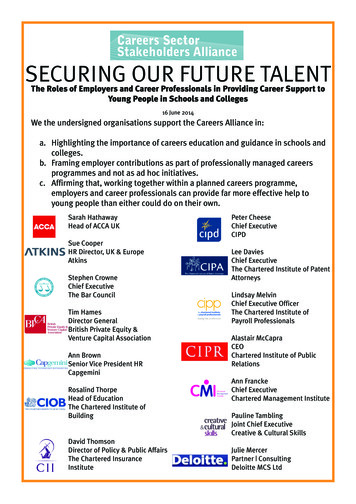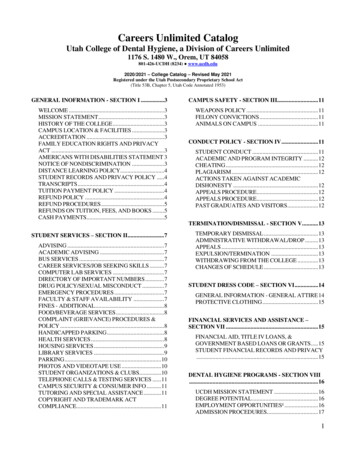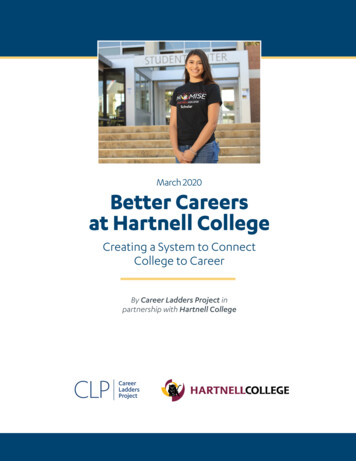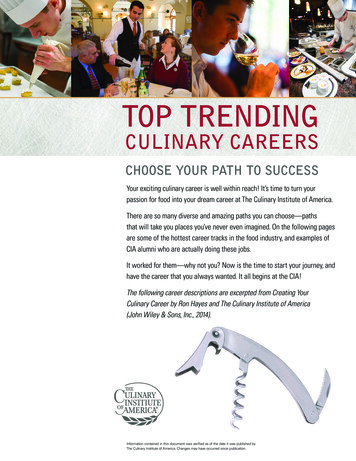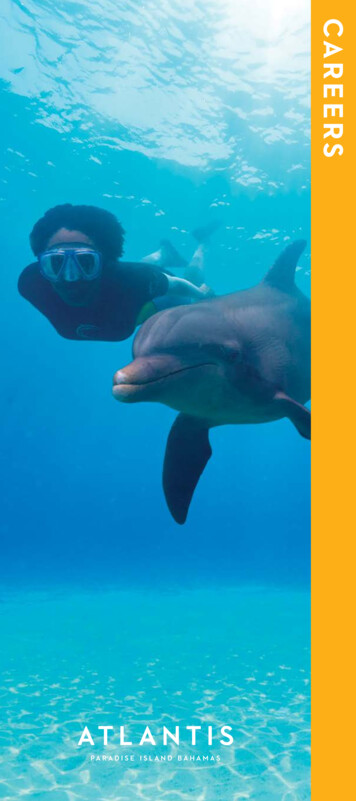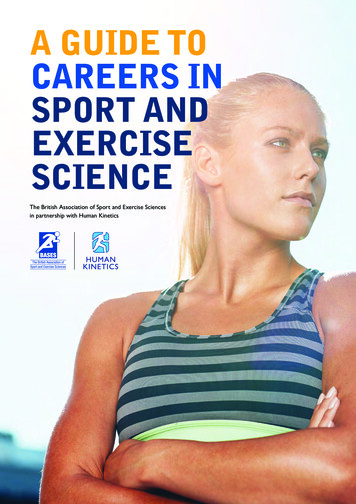
Transcription
A GUIDE TOCAREERS INSPORT ANDEXERCISESCIENCEThe British Association of Sport and Exercise Sciencesin partnership with Human Kinetics
WELCOME FROM BASESEXECUTIVE DIRECTOR2I know from my own experience that decisions about whatto study at university – and what to do after graduatingfrom university – can be overwhelming. However, it doesnot have to be the daunting and confusing task that it firstappears. There are lots of resources available to help youmake the right decisions and I hope that this guide will serveas a useful and informative resource, whether you are currently studying sportand exercise science at university, or are considering it as a possible career.The decision of what undergraduate or postgraduate course to study will notdefine your whole career but making a well-informed decision that reflects yourinterests and skills will help save you significant time and effort in the future andcan help you to stand out in a competitive job market. It is with this in mind thatwe have developed A Guide to Careers in Sport and Exercise Science; a conciseyet comprehensive guide, packed full of helpful information about careers insport and exercise science to help you to identify and pursue your dream jobor career.In developing this guide, we have obtained the views of many of our members:practitioners, researchers, lecturers, students and other professionals withinthe industry who have ‘been there and done that’. I hope that the guidanceand advice provided by these experts will help to answer some of thefrequently asked questions about careers in sport and exercise science and willsupport you in making decisions that will positively shape your future career.I wish you the very best of luck in whatever path you choose to take.Tom HoldenBASES Executive Director2BASES Human KineticsA Guide to Careers in Sport and Exercise Science
3CONTENTS56IntroductionWhat is sport andexercise science?10127The British Association ofSport & Exercise Science168Pursuing a career insport & exercise science19Entry requirementsChoosing anundergraduate courseBASES UndergraduateEndorsement SchemeChoosing apostgraduate course22242628BASES accreditation &supervised experience46Useful sites & resourcesInsider’s view: tips fromrecent graduates48Career pathways50AcknowledgementsHuman KineticsJob profilesExclusive member contentSixteen professionalsactive in their respectivefields discuss their workand the experiences thatled them to succeed in it.Join BASES to unlock thisexclusive content and geta host of other benefits atwww.bases.org.ukVersion 1.1 published October 2018.3www.bases.org.ukbasesukbases uk@basesukfacebook.com/basesuk
TARGET THE NEXTGENERATION OF SPORT ANDEXERCISE SCIENCE STUDENTSAdvertise in the BASES Career Guide/BASESUK@basesUKbases UKBASESUKTo find out more about attention-grabbing advertising opportunities visithttp://www.bases.org.uk/Advertising4BASES Human KineticsA Guide to Careers in Sport and Exercise Science
5INTRODUCTIONhis Careers Guide is for anyone interestedin pursuing a career in the field of sportand exercise science. The guide providesinformation to help you choose the right undergraduateor postgraduate course to pursue your chosen careerpath. For those who aren’t yet sure what they want todo after university, we have included a comprehensiveoverview of the range of careers that you could pursueafter graduation.TMany institutions offer courses in sport and exercisescience, covering a range of disciplines and subdisciplines. It can be a daunting process trying tonarrow down your choices to five courses on yourUCAS form or deciding on an area of specialism foryour postgraduate degree. We hope that this guidemakes these decisions less confusing by highlighting theimportant points you need to consider when choosinga course in sport and exercise science.5www.bases.org.ukbasesukIn this guide you will find an overview of a number ofcommon career paths of sport and exercise sciencegraduates. This includes 16 job profiles – written byprofessionals working in the sector – to give you aninsight into what each role entails and what qualifications,training and experience you will need if you want topursue that career.Finally, this guide provides a range of helpful information,tips and advice from sport and exercise scienceprofessionals and graduates on how to choose the rightcareer path (for you) and how you can be pro-activeduring your studies to improve your chances of landingthat dream job in the future.Feel free to use this guide in whatever way suits yourneeds, whether deciding if a career in sport and exercisescience is for you, narrowing down career options orchoosing the perfect sport and exercise science course.bases uk@basesukfacebook.com/basesuk
WHAT IS SPORT ANDEXERCISE SCIENCE?6THE DISCIPLINES OFSPORT AND EXERCISESCIENCEBiomechanics Anexamination of the causesand consequences ofhuman movement and theinteraction of the body withapparatus or equipmentthrough the application ofmechanical principles.Physiology The branch ofthe biological sciences thatis concerned with the waythat the body responds toexercise and training.There are many more applications for sport and exercisescience than within elite level sport.port and exercise science is the applicationof scientific principles to the promotion,maintenance and enhancement of sport andexercise related behaviours. It is fast becoming one of themost popular subjects to study at both undergraduateand postgraduate level. Sport and exercise science aimsto answer questions such as:S How does the human body respond to exercise?How can professional athletes maximise potential?What are the health benefits of regular activity?How do psychological factors influence sport andexercise performance?Psychology The branch ofsport and exercise sciencethat seeks to provideanswers to questions abouthuman behaviour andmental processes in sportand exercise settings.Interdisciplinary Involvesseeking to contribute to thebody of knowledge or solvea real-world problem insport or exercise using twoor more disciplines in anintegrated fashion from theoutset.Most undergraduate sport and exercise science degreeswill be structured around the three core elements ofsport and exercise science: biomechanics, physiologyand psychology. A graduate in sport and exercisescience would be expected to have a broad knowledgebase covering all three of these aspects and how theyinteract in both sport performance and health-relatedexercise. Postgraduate study will usually provide greaterspecialisation in one or more specific aspects of sportand exercise science.6BASES Human KineticsA Guide to Careers in Sport and Exercise Science
THE BRITISH ASSOCIATION OF SPORTAND EXERCISE SCIENCESPromoting excellence in sportand exercise scienceshe British Association of Sport and ExerciseSciences (BASES) is the recognised professionalbody for anyone with a professional interest inthe science of sport and exercise in the UK. BASES wasfounded in 1984 with the aim of establishing a powerful,unified voice to promote and support the interests ofsport and exercise science in the UK.TOur mission is to deliver excellence in sport and exercisescience through the promotion of scientific researchand evidence-based practise and the development ofhigh professional standards for the sector.7BASES represents sport and exercise sciences nationallyand internationally by promoting careers; organisingconferences and workshops; commissioning anddeveloping publications; endorsing degree courses;providing grants for research; and maintainingprofessional standards through a system of accreditation.Anyone who is studying sport and exercise science, oris working in a sport and/or exercise science relatedoccupation, is eligible to become a BASES member.Joining the largest sport and exercise science networkin the UK gives you access to a wide range of resourcesand benefits designed to support you through yourstudies and subsequent career. To find out more aboutthe range of benefits of becoming a BASES member,visit www.bases.org.uk.BASES lectures represent the best learning in the field.A strength test using an isokinetic dynamometer.A poster session.7BASES conference 2016.www.bases.org.ukbasesukBASES Fellow Professor Greg Whyte OBE.bases uk@basesukfacebook.com/basesuk
PURSUING A CAREER IN SPORTAND EXERCISE SCIENCEre you interested in human movement, sportsperformance, physical activity and health? Ifso, a career in sport and exercise sciencesmight be for you. The career opportunities availableto sport and exercise scientists are expanding all thetime and this growth appears likely to continue for theforeseeable future.AMost sports now recognise sports science as an integralpart of their development and success. Most athletesconsider the application of sports science as part ofeveryday training and competition. In relation to exercisescience, many hospitals, Clinical Commissioning Groups(CCGs) and National Health Service (NHS) trusts arenow appointing specialists with exercise qualifications towork in areas such as cardiac rehabilitation and healthpromotion. Recently published NHS quality standardsoutlining the role of physical activity in the preventionand treatment highlight the increasing importance ofexercise in healthcare.Despite the increasing number of job opportunitiesin sport and exercise science, the number of sportand exercise science graduates is also growing, makingcompetition for jobs intense. Students should, therefore,take every opportunity to gain experience and buildnetworks whilst at university and think about how todevelop your knowledge and skills beyond what youlearn on your course. Here are a few ideas about howyou can do this:Keep up-to-date with current issuesIt is important to recognise that in order to further yourcareer you will have to take responsibility for your ownprofessional development. Being a part of a professionalbody, such as BASES, can help you keep up-to-datewith news, upcoming events and the latest research in8the sport and exercise science sector and ensure youare kept aware of opportunities to gain experiencevia internships, research projects or presentingyour research at a conference. Remember that newresearch in sport and exercise science is constantlybeing published; being aware of the latest developmentsis one way to show your knowledge and passion foryour subject area – just make sure you are readingcredible sources as there is a lot of misinformation onthe internet and in the media.Gain additional qualificationsExtra qualifications may be essential for you to progressin your chosen career – or may simply help you standout in a crowded job market. Graduates who progressmost quickly in their careers are often those who havesought to gain additional experience and qualifications.Employers will see this positively in terms of yourwillingness to learn and as evidence of commitmentto your chosen career. Undertaking further coursesfollowing your degree will make you more marketableand hopefully help you move up the career ladder. This,in turn, will generally mean your earning power increasesaccordingly. Qualifications might include coaching, firstaid, gym instructing or safeguarding training.BASES Accreditation (see p22) is an industry-standardqualification for practising sport and exercise scientiststhat will open many doors to a successful career insport and exercise science. The most common route toAccreditation is via the BASES Supervised Experienceprogramme, which is open to anyone who has completedan undergraduate degree in sport and exercisescience. BASES also offers specialist accreditations forpractitioners working in high performance sport (BASESHigh Performance Sport Accreditation) or with clinicalpopulations (BASES Certified Exercise Practitioner).THE SPORT AND EXERCISE SCIENTISTBASES publishes The Sport and ExerciseScientist four times per year. It’s free to allmembers, full of insight, interviews, news,articles, reviews and much more.8BASES Human KineticsA Guide to Careers in Sport and Exercise Science
Competition for sport and exercise science jobs can be fierce. Be sure to give yourself the best possible chance of success.Joining a professional body can help you stay up-to-date with the latest industry news, research and opportunities.9www.bases.org.ukbasesukbases uk@basesukfacebook.com/basesuk
ENTRY REQUIREMENTS10BASES Human Kinetics10A Guide to Careers in Sport and Exercise Science
ppropriate qualifications are needed to geton to a degree course. For many students,this means gaining the required GCSE and ALevel grades at school or college. Check carefully whatA level subjects and grades are required for the coursesyou’re interested in as these can vary significantly. Mostinstitutions require A Level Physical Education or an ALevel science subject (e.g. Biology). You’ll usually needat least 5 GCSEs at grade C (new GCSE grade 4) orabove, including Maths and English. The UCAS websiteor university websites show you the sort of subjects andgrades required for different courses. Your teachers orcareer advisers can also offer help and advice.Business and Technology EducationCouncil (BTEC) qualificationsBTEC offer sport and exercise sciencecourses across their range of qualifications.ABTEC First Certificate/First Diploma(1 year full-time). You will usually need 1–2GCSEs grade C (new grade 4) or above toenrol. The course is equivalent to GCSElevel and can be progressed to a BTECNational Diploma.BTEC Extended National Diploma(2 years full-time). You will usually need 4GCSEs grade C or above, or a BTEC FirstDiploma to enrol. The qualification can beprogressed to a BTEC HND or used to gainentry to a degree course.There are alternatives to the traditional A Level route(see table below) which may be better suited to thosewho want to gain more vocational (job-related) skillsand experience that can be used to gain employment inthe sport and/or exercise sector. Part-time ‘pre-degree’qualifications are also available for those already workingin the industry, or who want to switch to a career insport and exercise science. Before selecting a course,check carefully that whatever route you choose issuitable to gain entry to the degree you’re interested in.BTEC Higher National Diploma (HND)/BTEC Higher National Certificate (HNC)(2 years full-time). You’ll usually need arelevant BTEC national diploma or relevantGCSE passes and A Levels. HNC/HNDcourses are offered by further educationcolleges and by some universities. From aHND you can progress to degree level study.In some cases you can transfer straight intothe second year of a degree course.Useful WebsitesBASES Course Finderwww.bases.org.uk/courses.phpFoundation Degrees(2 years full-time). A foundation degreeincludes a mix of traditional degreelevel teaching and ‘work-based learning’,where you undertake placements with anappropriate employer. You’ll usually needan A Level or equivalent. All foundationdegrees offer the chance to ‘top-up’ to a fullhonours degree by further study.Pearson (BTEC qualification regulators)qualifications.pearson.comUniversities and Colleges AdmissionsService (UCAS)www.ucas.comNVQ Framework LevelGCSE / A LevelsLevel 1 FoundationGCSE Grades D–G (new grades 1–3)Level 2 Intermediate* (new grades 4–9)GCSE Grades A–CBTEC First Certificate/First DiplomaLevel 3 AdvancedA LevelsBTEC Extended National DiplomaBTEC QualificationsLevel 411BTEC Higher National Diploma (HND)BTEC Higher National Certificate (HNC)Foundation Degree (FD)www.bases.org.ukbasesukbases uk@basesukfacebook.com/basesuk
CHOOSING ANUNDERGRADUATE COURSEith so many courses available it is importantthat you consider which is the best for you.To help you with this decision, the followingis offered as a guide to the key characteristics to lookfor in a sport and exercise science degree.WIs the course endorsed by BASES?BASES endorsement assures the appropriatenessof the curriculum, resources and opportunities thatundergraduate courses offer for training sport andexercise scientists. See p16 or visit the BASES website(www.bases.org.uk/bues) for more details on the BASESUndergraduate Endorsement Scheme.Are the three foundations of sport and exercise science(biomechanics, physiology, psychology) covered, as wellas interdisciplinary approaches? Unless you have a clearidea of what you want to do after your degree and knowa more specialist degree course is the right thing foryou, it’s better to choose a course that covers the threefoundation disciplines of sport and exercise science tokeep your post-degree options open. Often courseswith the same name have different content (and courseswith different names may cover similar material).How is the course taught and assessed?Make sure the course includes plenty of interactiveteaching sessions as well as lectures. You may also wantto think about the coursework to exam balance andchoose a course that complements your strengths.Are there good laboratory facilities to which youwill have access?Check that there is a strong practical skills element tothe course and that you will get hands-on experiencein the methods used by sport and exercise scientists.What research, consultancy and communityprojects exist?Involvement in these projects will allow you to gainexperiences and skills beyond the formal curriculum.Universities with high ranking research will generallypublicise this along with their research rating (4* beingthe top Research Evaluation Framework (REF) gradeawarded by the Higher Education Funding Council forEngland (HEFCE)).Career pathways and employability of graduates?Most institutions should be able to provide informationabout where graduates progress to after their degrees.Look for institutions that are successful in placinggraduates in sport and exercise jobs. The UNISTATSwebsite gives the percentage of students in graduatecareers after specific courses as well as average salaries.NSS,TEF and league tablesAs with all important decisions, it is advisable to seek asmuch objective information as possible to support yourchoice. There are a number of scores and rankings forUniversities and courses that you can access yourself.The National Student Satisfaction survey (NSS) asksfinal year students how satisfied they are with theircourses. The results are available via UNISTATS, whichalso gives some other key information, including therecently introduced Teaching Excellence Framework(TEF) scores (gold, silver or bronze) for each Universityfor their teaching quality. Various league tables are alsoproduced, including the Guardian University leaguetables and the complete University guide, which ranksUniversities and course areas based on various measuresincluding teaching, spend on students and researchexcellence. These may help you in shortlisting particularUniversities and courses.Unless you have a clear idea of what you want to doafter your degree and know a more specialist degreecourse is the right thing for you, it’s better to choose acourse that covers the three foundation disciplines ofsport and exercise science.12BASES Human Kinetics12Choosing anundergraduate course canbe difficult. You’ll needto consider a variety ofdifferent criteria to makethe best choice for yourselfand your future.A Guide to Careers in Sport and Exercise Science
Photograph: English institute of sport (EIS)13www.bases.org.ukbasesukbases uk@basesukfacebook.com/basesuk
If you are interested inthe topic of your degreeyou are more likely to dowell in it. Many studentsstudying sport andexercise science have astrong interest in the areaand this is a big advantage.What to studyIt may seem obvious, but it is worth stressing that if youare interested in the topic of your degree you are morelikely to do well in it. Many students studying sport andexercise science have a strong interest in the area andthis is a big advantage.Some universities offer discipline-specific programmesof study at undergraduate level, for example, Sport andExercise Psychology. These courses tend to provide lessbreadth of study than traditional sport and exercisescience courses. Such specialist courses may appeal tothose applicants with a clear idea of their disciplinaryinterests and career progression, but this route canlimit the range of potential options later in one’scareer. Generally speaking, a broad understanding ofsport and exercise science is best achieved throughmultidisciplinary study at the undergraduate level(i.e. a course that covers biomechanics, physiologyand psychology). A specialism can then be developedthrough relevant postgraduate study.Where to studyYou won’t do very well in your course if you’re unhappy,so pick an institution that you think you will enjoyattending. For some this means a city centre location,others prefer an out of town campus. Find out aboutthe social and sporting facilities available, particularly ifyou have a specific sport you are keen to get involvedin. You should also consider housing and other costsand how far you want to be from home. Find out whatsort of help and support is available to students whoexperience problems during their time at university.14BASES Human KineticsA Guide to Careers in Sport and Exercise Science
Things that will help you decideApplying through clearingDo your research carefully and pick what you believeis the right course in the right location. Look in detailat what each course offers before making your choicesand do not select simply on the course name. Mostinstitutions offer open days, so go along and see whatthe place and people are like and ask lots of questions.Talk to friends and family but decide for yourself.Sometimes things do not go to plan and you do not getthe grades you need for your first choice of institution.It is always worth phoning them anyway, as they may stillagree to accept you. However, if they do not, the UCASwebsite will list all institutions that still have places. Itwill also give details of how to apply to formally enterthe clearing process. It is important that you do notpanic and simply accept the first place that comes along.Check that the course and institution will suit you and,if possible, go to visit and talk to the staffMost universities can provide information on the initialdestination of their graduates after they complete theirdegrees. While it is worth noting that this type of datamay not be a reliable indicator of the longer-term careerpathways of sport and exercise graduates, recent studies*suggest that 15–20% of sport and exercise sciencegraduates go on to further study following their firstundergraduate degree, with 65–75% finding employmentwithin six months of graduating.In terms of the types of jobs that graduates find aftercompleting their degrees, this tends to vary widely.Studies suggest that around 70% of sport and exercisegraduates go on to work in jobs directly related to theirarea of study**. The remainder tends to use the skillsand knowledge they have acquired during their degreeto enter the wider job market as graduates with a strongbackground in scientific theory and application.Useful websitesBASES Undergraduate her Education Funding Council forEngland (HEFCE)www.hefce.ac.ukUniversities and Colleges AdmissionsService (UCAS)www.ucas.comUNISTATSwww.unistats.ac.ukIt is worth asking universities for any information theyhave on what industries and job roles their sport andexercise graduates go on to work in after completingtheir undergraduate degrees. The UNISTATS website *Data from 2016 Destinations of Leavers from Higheris another useful resource for finding information about Education survey **Based on two, 5-year follow-up surveysstudent satisfaction and employment outcomes for of graduates from the Department of Exercise and Sportparticular University courses.Science, MMU, Cheshire15www.bases.org.ukbasesukbases uk@basesukfacebook.com/basesuk
BASES UNDERGRADUATEENDORSEMENT SCHEME (BUES)he BASES Undergraduate EndorsementScheme (BUES) endorses sport and exercisescience courses that provide undergraduateswith the opportunity to develop the knowledge andskills that BASES considers essential to enter into theprofession as a practicing sport and exercise scientistor to progress to postgraduate study.TWhen reviewing a course, BUES will consider theknowledge, technical skills, competencies and practicalexperience gained by students through the curriculumand resources available. Courses need to demonstratethat students will gain core competencies and knowledgein each of the sub-disciplines of biomechanics, physiologyand psychology. Courses must also demonstrate thatsufficient student learning is dedicated to studying ofan interdisciplinary nature. In addition, the curriculummust include research methods and an independentstudy project in the field of sport and exercise science.The BASES website, www.bases.org.uk, includes a list ofcourses that have successfully obtained endorsement,as well as more detail on the criteria for gaining BUESendorsement. For more info visit www.bases.org.uk/bues.For a degree that provides the knowledge and skills thatBASES considers essential, pick a BUES endorsed course.16BASES Human Kinetics16BUES UniversitiesThe following universities all have sportand exercise science undergraduate degreecourses that are endorsed by the BritishAssociation of Sport and Exercise 2627282930313233343536373839University of UlsterUniversity of ChesterLiverpool John Moores UniversityEdge Hill UniversityUniversity of EdinburghUniversity of Central LancashireUniversity of BoltonNorthumbria UniversityUniversity of SunderlandYork St John UniversityLeeds Beckett UniversityUniversity of HuddersfieldUniversity of SalfordManchester Metropolitan UniversitySheffield Hallam UniversityUniversity of DerbyStaffordshire UniversityUniversity of WolverhamptonAberystwyth UniversityUniversity of WorcesterUniversity of GloucestershireSwansea UniversityUniversity of South WalesCardiff Metropolitan UniversityBirmingham City UniversityCoventry UniversityUniversity of WinchesterOxford Brookes UniversityUniversity of PortsmouthUniversity of BedfordshireAnglia Ruskin UniversityBucks New UniversityUniversity of HertfordshireSt Mary’s UniversityUniversity of SurreyUniversity of ChichesterUniversity of BrightonSouthampton Solent UniversityUniversity College Plymouth MarjonA Guide to Careers in Sport and Exercise Science
23342435253626373839
Interested in Online Learning?There’s nothing stopping youStudy part-time postgraduate courses in BECOME UNSTOPPABLE WITH ADEGREE FROM THE UNIVERSITYOF SALFORD MSc Applied Sport and Exercise Science MSc Sports Coaching MSc Sport and Exercise Psychology*Why choose Online Learning?Our range of undergraduate and postgraduatecourses can help you gain the skills, knowledgeand practical experience you need to take yourcareer to the next level. Combine flexible delivery with full-time employment Participate in a dynamic community of active learners Engage with research-active experts with over 10 years’experience of delivering online learning Access to learning materials 24/7Subject areas include:/ Sports Science/ Strength and Conditioning/ Exercise, Nutrition and Health/ Sport Rehabilitation*BPS validated, full-time option also availableFor our full list of courses, visit salford.ac.ukEnquiriest: 44(0) 1782 294400e: e/subjects/sport-and-exercise/School of Life Sciences and EducationStoke-on-Trent, ST4 2DEBECOME UNSTOPPABLE WITHMSC CLINICAL EXERCISE PHYSIOLOGYAT THE UNIVERSITY OF SALFORDWith ever-increasing numbers of patients beingreferred for exercise-screening and prescription,this course will give you the skills and knowledgeto use ‘exercise as medicine’.BASESANNUAL STUDENTCONFERENCE 2020Equality, Diversity and Overcoming Adversityin Sport and Exercise Science/ ideal for those working, or who want to work,with applied science in a clinical setting/ access our state-of-the-art ExercisePhysiology and Human Performance labs/ study at our campus just 2km fromManchester city centreFor full course details, visit salford.ac.ukWednesday 15 – Thursday 16 April 2020Solent University, Southamptonwww.solent.ac.ukSponsored by
19CHOOSING APOSTGRADUATE COURSEne increasingly popular option for sport andexercise science graduates wishing to enhancetheir employment prospects is to study aMasters programme. Whilst the costs involved can beconsiderable (typically in the range of 6,000– 8,000for one year’s full-time study), the long-term returns,both financially and in terms of job satisfaction, havebeen shown to be well worth the investment.OMost universities require applicants to gain at least a 2.1.Honours degree and expect a clear commitment to thearea of study. The general expectation is that applicantsfor postgraduate courses in sport and exercise scienceswill be looking to develop an area of specialism basedupon a more broad-based, undergraduate degree.Masters programmes should enable you to develop thisspecialist knowledge and skills, adding value to yourundergraduate degree.If you have the option of full- or part-time study, thenconsider carefully which option is better suited to yourcareer intentions. Part-time study can enable you tocombine study with existing work commitments, butsome flexibility will be required from employers or, ifyou are self-employed, some adaptation of your normalworkload will be needed. Most students, however,choose the full-time option, which normally involvesa minimum of 12 months of study.You are advised to check out the research activity (e.g.Research Evaluation Framework (REF) ratings) at yourchosen university and find out what opportunities areopen to Masters students to get involved in researchprojects or consultancy work. Also, consider theavailability
the sport and exercise science sector and ensure you are kept aware of opportunities to gain experience via internships, research projects or presenting your research at a conference. Remember that new research in sport and exercise science is constantl

